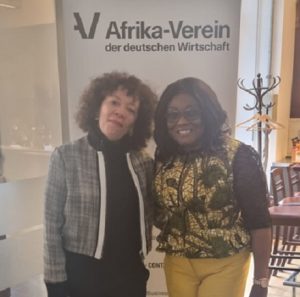Ghana’s Ambassador to Germany, Gina Ama Blay, has said that the G20 Compact with Africa is more than a paper proposal, having the potential to provide a brighter future for millions throughout the continent.
“It is a pledge to bring about macroeconomic stability, business reforms, and robust financing structures that can catalyse a new era of private investment in Africa, especially in the realm of infrastructure development,” she intimated.
Addressing the Africa Insight event organised by Afrika-Verein on October 11, 2023, Mrs. Blay said Ghana’s participation in the Compact with Africa Initiative (CWA) is evidence of the country’s conviction in the transformative power of collaboration and partnership.
Ambassador Blay stated that this year, as the conference shifts its focus to policy issues with business relevance in Africa, it is critical for all stakeholders to understand the broader implications of the G20-led cooperation with twelve (12) African countries, including Ghana.
“It is our belief that the Compact will continue to serve as a platform to address political actors within both parties, synchronising country-specific reform plans, and promoting investment opportunities which will serve as building blocks for a prosperous Africa,” she noted.

Ambassador Gina Blay and Corinna Bremer at a recent Table Media encounter in Berlin
According to her, Germany’s G20 presidency in 2017 was a turning point for the Compact.
“The vision was clear and ambitious: to transform Africa into an attractive investment hub for German companies, thereby addressing the challenge of irregular migration through job creation and opportunity,” she stated.
Mrs. Blay continued, “Today, as we reflect upon this vision, it is essential to evaluate the progress made and deliberate on the course ahead of us.”
She asserted that the expectations of Ghanaians were clear, and that in view of the excellent progress made under the Compact since its inception in 2017, Ghana is eager to further enhance and solidify these developmental milestones.
“It is through our collaborative spirit and shared vision that initiatives such as the Volkswagen vehicle assembly plant have found a conducive environment in Ghana,” she noted.
Ambassador Blay said the goal of the Ghana Automotive Development Policy, along with other car assembly plants, is to make Ghana a fully integrated and competitive industrial hub for the West African automotive industry.
The ripple effects of this initiative are evident, she added, and continued, “It leads to the creation of job opportunities and reduces our reliance on imported second-hand vehicles, thereby supporting our currency.”
“Moreover, it opens avenues for us to benefit from exporting vehicles produced in Ghana,” she posited.
She stated that Ghana is looking at strengthening ties with Germany and other G20 countries in order to attract investments that align with its national agenda.
“Projects like the Volkswagen assembly plant are not just economic ventures; they symbolise a shared commitment to progress and development,” Mrs. Blay stressed.
According to her, in a region that has lately seen political upheavals and coups, Ghana’s steadfast democratic culture stands as a shining example.
“We hope to, consequently, leverage this position to encourage more G20 nations to invest in our country, fostering an atmosphere of mutual growth and understanding,” she said.
She explained that the Government of Ghana’s current goal is to mitigate the impact of the COVID-19 pandemic and return the country to a sustainable path of strong growth in order to create a more resilient and transformed economy.
“Our priority areas, therefore, are Agro-Farming, Energy production, Digitisation and Housing & Construction.
“One of the most significant areas of collaboration between Ghana and European partners, including Germany, is in the health sector,” she disclosed.
Mrs. Blay said the European Union and German Development Cooperation have been instrumental in strengthening the Food and Drugs Authority (FDA) of Ghana.
“This collaboration aims to enhance the FDA’s capacity regarding facilities and personnel to ensure the quality, safety, and efficacy of locally manufactured vaccines that meet international standards.
“The ultimate goal is to upgrade the FDA to a World Health Organisation (WHO) Maturity Level 4 regulatory agency for vaccines,” she stated.
Ambassador Blay indicated that this partnership is pivotal for Ghana’s ambitious plan to become a Pan-African vaccine manufacturing hub.
“The immediate objective is to produce the first batch of fill and finish COVID-19 vaccines by 2024, with plans to expand production to other vaccines, including those for childhood immunisation and malaria,” she said.
She acknowledged that the recent coups in sub-Saharan Africa undeniably casts a shadow of uncertainty over international partnerships in the region.
“Investors, both current and potential, continue to observe the evolving landscape, gauging the risks and rewards. It is in these challenging times that the role of political actors becomes paramount.
“To ensure that markets remain stable and partnerships endure, there must be a concerted effort from both G20 and African nations,” she suggested.
“Open dialogues such as the Compact with Africa Conference, transparent policies, and a commitment to stability are the need of the hour.
“Together, we can navigate these turbulent waters and ensure that the foundations of our partnerships remain unshaken,” she underscored.
“The G20 Compact with Africa Initiative affirms the positive impact of cooperation. It is a reminder that when nations come together with a shared vision, the possibilities are limitless and achievable,” she intimated.
“As we move forward, let us remember the core values that bind us: mutual respect, understanding, and a relentless pursuit of progress.
“Together, we can shape a future where Africa stands tall, not just as a continent of immense potential, but as a beacon of hope, progress, and prosperity,” she submitted.
